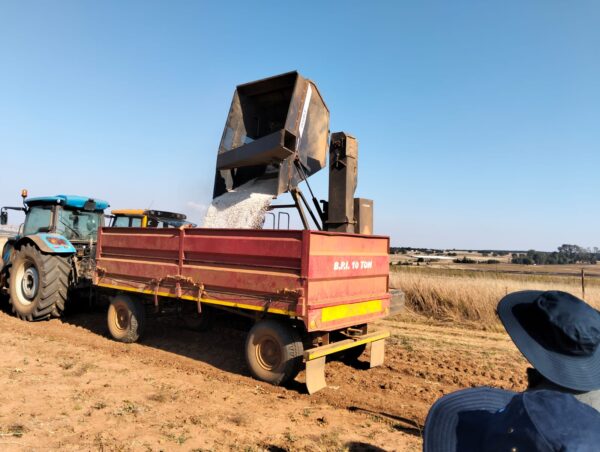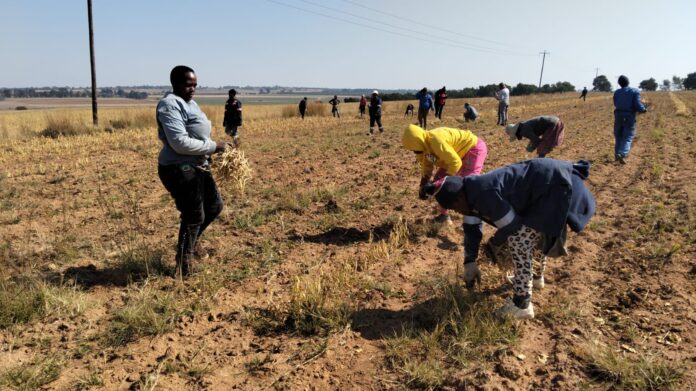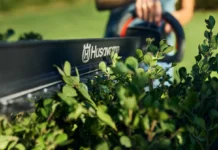Tiger Brands, Africa’s largest listed manufacturer of fast-moving consumer goods, is intensifying efforts to support local growers of small white beans in a move aimed at reducing reliance on importing the beans used in the production of the firm’s South Africa’s iconic Koo baked beans.
According to Dumo Mfini, Managing Director for Culinary at Tiger Brands, the company was compelled to import 2,500 tonnes of small white beans from North America last year—at a cost 30% higher than local procurement.
“This was the first time in our history dealing with the beans that we were forced to import because we had foreseen a 40% loss in last year’s local crop as a result of poor quality,” Mfini explained during Tiger Brands’ recent heritage tour to two black women-led farms in Bronkhorstspruit and a visit to the company’s Boksburg culinary facility.
The initiative, part of Tiger Brands’ commitment to local sourcing and agricultural development, aligns with broader goals of empowering smallholder farmers and ensuring food sustainability. “It takes a village to raise a child,” said Mfini, likening the local production effort to nurturing something vital. “This is a child we are trying to groom at Tiger, and it is our promise to localise production as much as we can.”
Fefe Maqubela and Marinkie Ntuli-Masimula are among the women farmers whose farms were visited. After planting in late January, they say their farms delivered 53 tonnes of beans last week and which were accepted for canning adding that more deliveries are expected in the coming days.
For Maqubela who owns Fefe’s Farm in Bronkhorstspruit, she says she chose to grow small white beans because of their market value and fast-growing cycle.
“Besides other crops, this variety of beans earns well per tonne although it is not easy as it is a sensitive type. If your beans are rejected, you lose money or get downgraded and that affects your whole season,” she said.
Ntuli-Masimula, owner of Marinkie Farming in Bronkhorstspruit, said it was her first time selling to Tiger Brands and she was thrilled. However, she pointed out the need for support.
“We were supposed to plant more than 300ha but we couldn’t afford enough seeds. The profit is good, but only if you have capital. We need mechanisation support and seed finance. Then we could work miracles,” says Ntuli-Masimula.
Sipho Modiba, agricultural procurement manager at Tiger Brands, said the harvest was one of the best the company has seen, but the future depends on infrastructure, especially irrigation.
Nicole Bwambale, Business Specialist at Kito, highlighted their role in enabling local SME success through financial and strategic support. “Our social impact strategy has three pillars: education, SME development, and business management. We funded AZ Holdings, providing loans for equipment and support systems, enabling them to scale and assist more farmers,” she explained.
Bwambale emphasized that agriculture is central to their mission, saying, “With more partners, we’ll be able to really deliver on this. Agri-Tiger is a great market, and we’re proud to support it.”
Quality control
Quality control has been a central issue. Mfini reiterated Tiger Brands’ stringent standards: “If your quality is not the quality that Koo can trust, unfortunately, we can’t put it in the can. But I’m happy to report that all the quality beans harvested yesterday were accepted.”
Tiger’s Heritage Day tour allowed stakeholders to observe the entire bean harvesting process—from windrows to boxbags—emphasizing transparency and shared responsibility in the supply chain. At the heart of this transparency is collaboration, something Mfini acknowledged as essential.
“We’ve got a commitment together. We’ve been challenged to provide 150,000 tonnes this year. Last year we fell short, hence this project is so important,” he said.
In essence, Tiger Brands’ move is not just about reducing imports—it’s a commitment to uplifting South Africa’s agricultural sector, one bean at a time. “We are for farmers, and we are farmers,” said the Social and Solidarity Economy (SSE) representative. “We understand their struggles, and we’re on the ground with them. The best fertilizer is the farmer’s feet on the soil—and ours, too.”
Tiger Brands plans to increase its local supply from 19,000 tonnes to 28,000 tonnes by 2030 under its five-year procurement strategy.
The company is also working on product innovation. A new, easier-to-open bean can will be launched next month after customers, especially single women, joked online about struggling to open the current one without a knife or the help of a man.








